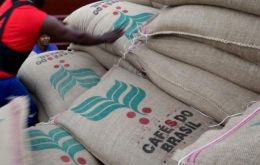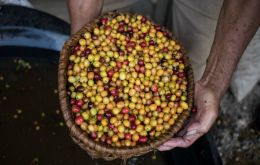MercoPress. South Atlantic News Agency
Tag: coffee
-
Monday, December 1st 2025 - 09:06 UTC
Venezuelan coffee exports grow 500% from 2024

Venezuelan officials have reported a 500% rise in coffee exports this year compared to 2024. The announcement was made during the recent IV International Meeting of Venezuelan Specialty Coffees (Eicev 2025).
-
Tuesday, September 16th 2025 - 08:52 UTC
Exports of special Brazilian coffee to US plummet

Brazilian exports of specialty coffee to the United States have plummeted following the imposition of a 50% tariff by President Donald Trump. Last month, Brazil shipped just over 21,600 bags of specialty coffee to the US, representing a staggering 79.5% drop compared to the same month in 2024, according to data released by the Brazilian Coffee Exporters Council (Cecafé) on Monday.
-
Saturday, July 19th 2025 - 10:45 UTC
Demand for Bolivian coffee on the rise

Although not typically associated with Bolivia, this South American country has exported over 27,000 tons of high-quality coffee in the past decade, generating over US$108 million in revenue.
-
Thursday, February 6th 2025 - 10:07 UTC
Brazil: Coffee price expected to remain high

The Brazilian Coffee Industry Association (ABIC) said it expects prices to continue rising in the coming weeks, at least until this year's harvest, which begins around April or May, due to recent adverse weather coupled with increasing global consumption boosted by exports to the newest customer: China.
-
Thursday, May 11th 2023 - 10:36 UTC
Brazilian coffee exports fall 10.3% in April

According to this week's latest report from the Council of Brazilian Coffee Exporters (Cecafé)., Brazil exported some 2.7 million bags (60 kilos) of coffee last month, 10.3% less than in April of 2022, which represented US$ 604.5 million in revenues, 16.9% less than in the same month last year.
-
Monday, February 13th 2023 - 09:36 UTC
Luxury Coffee Experience: Australian coffee shop offers Panamanian coffee at $140 per cup

A café in Melbourne, Australia offers its customers a unique experience by serving a cup of coffee for 140 dollars, 50 times the market price. The city of Melbourne has a tradition of coffee culture, which was fostered by Italian and Greek migration from the 1940s.
-
Monday, July 15th 2019 - 15:21 UTC
China surges as new major destination for Brazil's coffee exports

Brazilian exports of coffee to China rose 23.1 annually during the first five months of 2019, according to a Brazilian Council of Coffee Exporters (Cecafé) report.
-
Tuesday, June 18th 2019 - 08:33 UTC
Colombian town brewing the largest cup of coffee, waiting for Guinness Records

A Colombian town is hoping to brew up to two world records: one for the world's largest cup of coffee and the second for the largest coffee tasting.
-
Friday, April 12th 2019 - 18:06 UTC
Swiss government wants to get rid of its coffee emergency stockpile

The Swiss government wants to put an end to its emergency stockpile of coffee after declaring that it is “not essential” for human survival. Switzerland began storing emergency reserves of coffee between World War One and World War Two in preparation for potential shortages.
-
Friday, April 12th 2019 - 17:32 UTC
A leading Brazilian coffee exporter files for bankruptcy, hoping to restructure a debt of US$ 282 million

Terra Forte, one of the largest Brazilian coffee exporters, has filed for bankruptcy protection in a Sao Paulo state court, lawyers for the company said. Law firm Freire, Assis, Sakamoto e Violante said Terra Forte was looking to restructure 1.1 billion reais (US$ 288.2 million) in debt.
